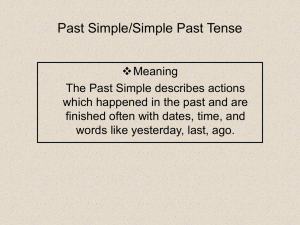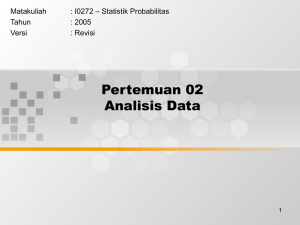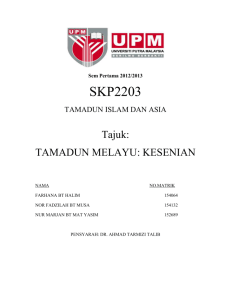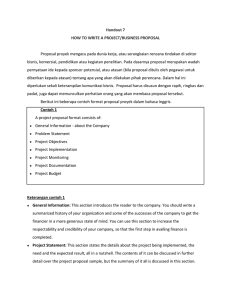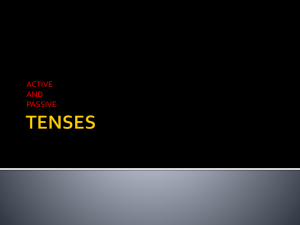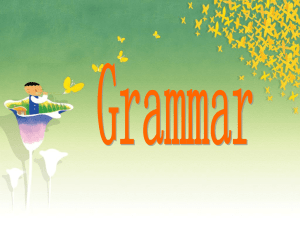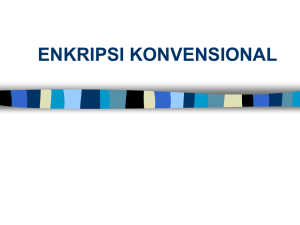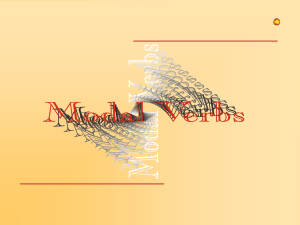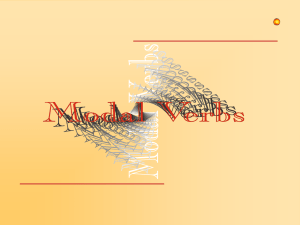Modal Modals are auxiliary verbs which are used to
advertisement
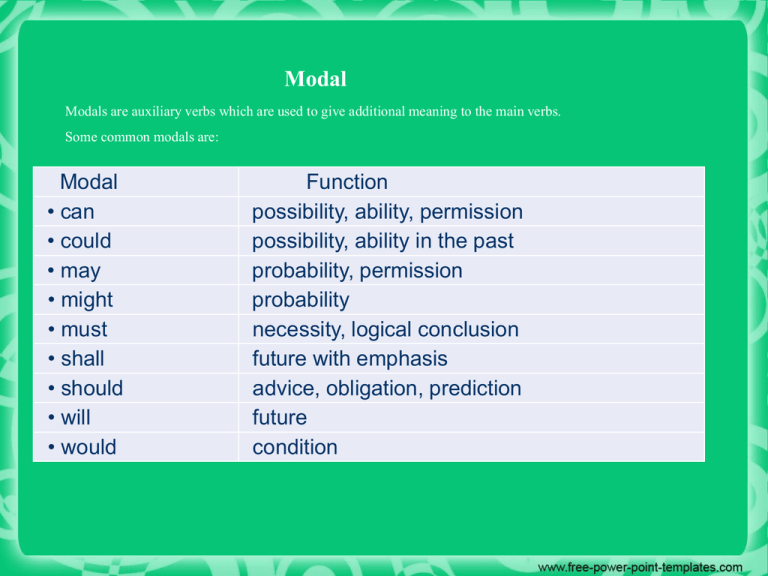
Modal Modals are auxiliary verbs which are used to give additional meaning to the main verbs. Some common modals are: Modal • can • could • may • might • must • shall • should • will • would Function possibility, ability, permission possibility, ability in the past probability, permission probability necessity, logical conclusion future with emphasis advice, obligation, prediction future condition PRESENT can may must shall will ought to PAST could / might had to Should Would have to need (?,-) had to dare (?,-) - - - used to ARTI dapat boleh harus akan/seharusnya akan seharusnya harus perlu berani dulunya biasa • Auxiliaries selalu diikuti oleh verb I. Contoh - He goes to school, (will) • He will go to school. • Jane was there yesterday, (had to) • Jane had to be there yesterday. • The man saw me this morning, (would) • The man would see me this morning. LETAK AUXILIARIES DALAM KALIMAT Possitive : terletak dl depan kata kerjanya. Contoh : John can swim well. • They had to buy the house last year. • The cat used to drink milk. Interrogative : terletak pada awal kalimat di depan subyeknya. Contoh : Would Jane tell It ? Can you do It ? Must he stay here ? Auxiliaries dengan to dalam susunan kalimat tanya diplsahkan letaknya. Contoh : Ought I to stay ? Negative: terletak di depan kata kerjanya dan diikuti not. Contoh : Susan will not try again. Bob cannot agree with you. Jane need not come. • Not dalam susunan auxiliaries dengan to dlletakkan dl antara auxiliary dengan tonya. Contoh : I have not to go. • • • • • • • • Can cannot/can’t May mayn’t Must mustn’t Shall shan’t Will won’t Have to haven’t to Ought to oughtn’t to Need needn’t Dare Could might Should Would Had to Used to daren’t couldn’t mightn’t shouldn’t wouldn’t hadn’t to usedn’t to Bentuk negative must adalah needn't. Contoh : (+) I must go to school. (-) I needn't GO to school. [mustn't = dilaranq / iangan] Contoh : You mustn't smoke here. Shall dipakai oleh dan we, Will dipakai oleh semua kata ganti. Contoh : (+) I shall go now. (?) Will you go now ? 1. 2. 3. 4. 5. 6. 7. 8. The doctor goes to the hospital today, (can) John learnt to play the guitar, (would) Did Jane tell you that ? (would) You go home this weekend, (may) The child drank the medicine, (ought to) The boys are near the river, (have to) They sold their house last week, (would) Susan wears a new dress on her birthday, (must) 9. Do the children sing the song ? (can) 10. You are with the child, (ought to) 1. She was with her mother, (could) 2. The boy wakes up late, (may) 3. Tom finishes the homework, (will) 4. The teacher teaches us this semester, (will) 5. Does the girl get good grades ? (must) 6. Mary always works hard, (must) 7. I go to the store now. (shall) 8. My cousin is here next week, (will) 9. I don't find any marbles, (can) 10. She went to church last Sunday, (might) 1. She introduces him to you. (has to) ? 2. I am near the chalkboard, (shall) 3. My father was very angry, (could) 4. John visits his cousins on Thursday, (may) 5. My sister went to the movie alone, (might) 6. She visits her friend on Tuesday, (must) 7. My father smoked a lot during the trip. (used to) 8. The men were on their journey. (could) 9. I memorize the dialogue. (.shall) 10. James doesn't see his doctor for the cold, (will) 1. They can read French. 2. He is ten years old. 3. He may use this one. 4. They can sell the two cars. 5. She was furious. 6. He should try again. 7. It could move very fast. 8. You were right. 9. You must tell him. 10.He can leave it here. 1. It will be in his pocket. 2. She has to bring her notebook. 3. I shall be here. 4. She is afraid of mice. 5. She may borrow the car. 6. He is sorry for her. 7. There will be a lot to do. 1. I have told you here. 2. He'll be able to carry it. 3. They used to live here. 4. The river was four meters deep. 5. We must hurry. 6. He ought to wait. 7. He would enjoy it. 8. They are having lunch. 9. We have to finish it. 10. You are hungry. 1. 2. 3. 4. 5. 6. I'll work without any help. He used to eat them raw. There'll be plenty for everyone. He was very bad-tempered. She is leaving tonight. You are very good at this. 1. 1. They have eggs for breakfast. 2. He needs a new coat. 3. Your cat catches mice. 4. They have to work hard. 5. She does the housework. 6. We know the place. 7. You like mushrooms. 8. He understands the problem. 9. He needs more money. 10. You drink coffee. 1. He had to borrow one. 2. The journey takes two hours. 3. He made a lot of mistakes. 4. She had a look at it. 5. Her hair needed a new style. 6. It matters very much. 7. He does his homework after supper. 8. She has a cold bath every morning. 9. They like a lot of noise. 10. She had to make a speech. D. Answer using yes or no in complete sentences. 1. Ought the man to help the girls? (Yes) 2. Must the lady carry all the parcels? (No) 3. Will you agree with the Idea? (Yes) 4. Has the secretary to type this letter? (No) 5. Shall I move to another chair? (No) 6. Can they read the handwriting? (Yes) 7. Should the headmaster call his parents? (No) 8. Need we open these boxes? (No) 9. Might the workers stay here for a rest? (Yes) 10. Could you translate the passage for me? (No) 1. You nave lunch at one. 2. She dared him to climb it. 3. You did it on purpose. 4. He has to paint his house every year. 5. He dared to say that. 6. They had a good time. 7. The drink did him good. 8. My watch wants a screw. 9. She came again. 10. He had to wait for you.
